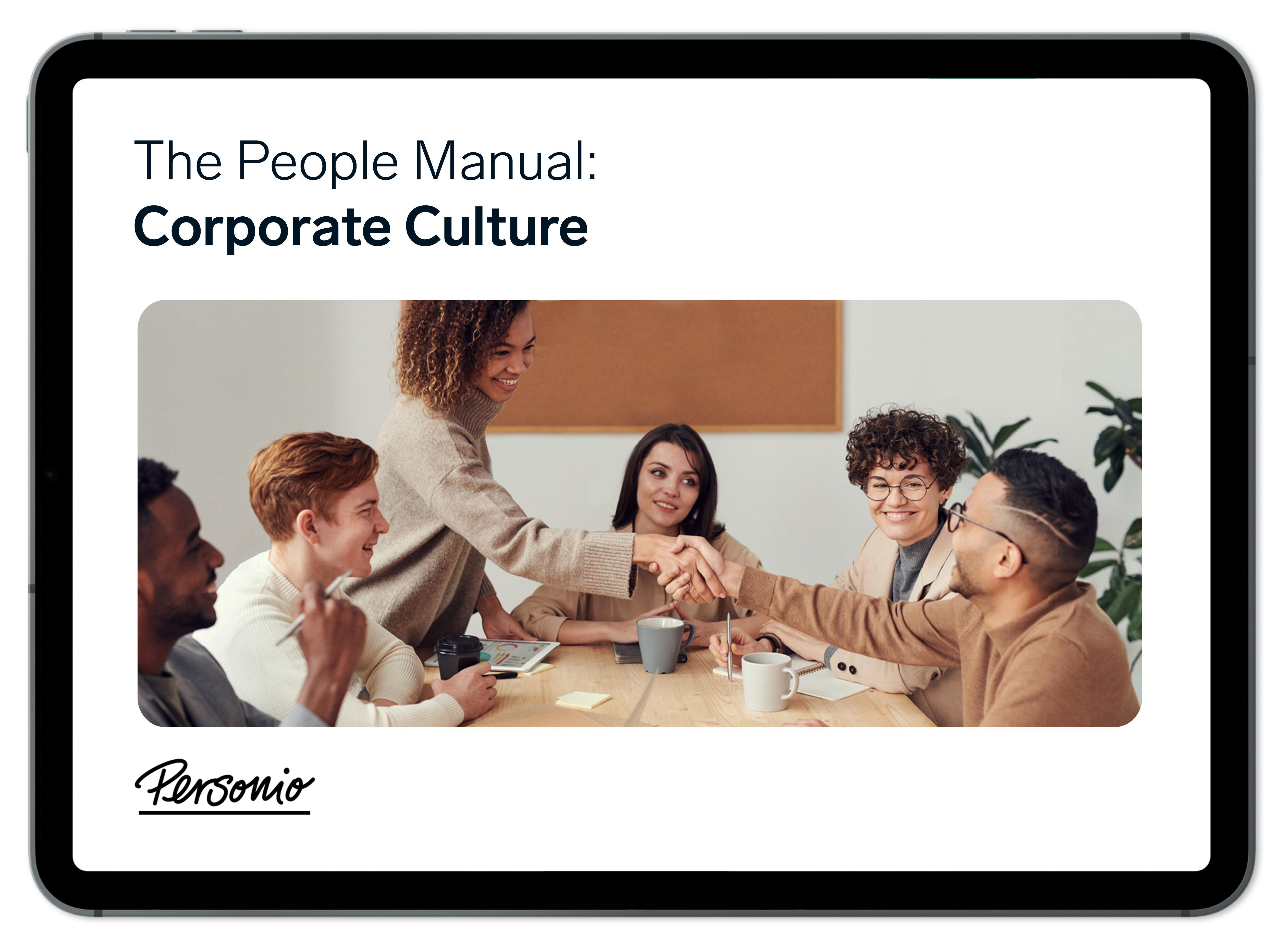
Download our free guide
Everything you could possibly need to know about corporate culture.
Download it todayThe Benefits of Organisational Citizenship Behaviour

In this article, we aim to help you understand organisational citizenship behaviour (OCB), the advantages and disadvantages of OCB, and the different types of OCB, along with best practices and some frequently asked questions.
Key Facts
Organisational citizenship behaviour is not motivated by reward, but by the satisfaction of being effective at work.
There’s a balance between encouraging OCB in the workplace and ensuring that employees prioritise their mental and physical well-being.
When interviewing, you can look for candidates that demonstrate OCB based on how they respond to questions about past work experiences.
Contents
- 1What is Organisational Citizenship Behaviour?
- 2Advantages and Disadvantages of Organisational Citizenship Behaviour
- 3Types of Organisational Citizenship Behaviour
- 4Best Practices of Organisational Citizenship Behaviour
- 5How Are Rewards Handled in OCB?
- 6Frequently Asked Questions About Organisational Citizenship Behaviour
- 7Bring OCB to Your Workplace
What is Organisational Citizenship Behaviour?
In the workplace, Organisational Citizenship Behaviour (OCB) refers to the behaviours of individuals that impact the company. People who demonstrate these behaviours often stand out in their workplace for their willingness to always lend a helping hand. The idea of OCB was defined by Dennis Organ in 1988 as “an individual behaviour which is not rewarded by a formal reward system... but that, when combined with the same behaviour in a group, results in effectiveness.”
Advantages and Disadvantages of Organisational Citizenship Behaviour
OCB has a strong influence on both workplace productivity and culture. Some of the advantages and disadvantages include:
Advantages of OCB
The following are researched advantages of organisational citizenship behaviour:
A sense of greater autonomy in the workplace. Giving employees the power to conduct their business on their own terms creates a sense of agency and ownership, empowering them to make good decisions and do good work. When encouraged in the workplace, OCB gives employees a greater sense of freedom and, therefore, the confidence to complete the task more efficiently.
The potential to lead new professionals. OCB can yield positive results when introduced to young professionals early on in their careers, as new employees are more open to new styles of working.
It can instil meaning in a career. When people feel inspired by the work they do and associate it with purpose, they’re driven to tackle challenges that come their way. This sense of purpose keeps employees motivated. Plus, this sense of meaning helps employees feel valued in what they do.
Chance to improve how an employee approaches a task. OCB can lead to higher job performance and enthusiasm in the workplace, which can impact how an employee approaches a task. With a more open and positive attitude, they can approach a problem from a different, creative perspective. They can also tap into teamwork to gain further insight. Moreover, since collaborative thinking can yield better results, this can lead to higher productivity and efficiency.
Increases a feeling of togetherness. With an emphasis on enthusiastic collaboration, people can feel more united as a team. This is also intriguing to new or potential employees when it’s clear how much people enjoy working together to accomplish tasks.
Disadvantages of OCB
Some drawbacks of organisational citizenship behaviour include:
Unreasonable expectations. OCB can lead to “compulsory citizenship behaviours,” which is when managers assume employees should perform tasks outside of their job description. It places unrealistic expectations and pressure on the employee, which can lead to burnout and lower quality work. So keep in mind your employee’s skillset.
It can decrease the authenticity of behaviours. If OCB comes from an authentic place, then this can yield highly positive results. However, if an employee is motivated by rewards like promotions or favourable treatment, it can foster motivation for the wrong reasons. That’s because OCB practices tend to falter once the end goal – like a raise – has been achieved. For that reason, it’s best not to tie employee reward and recognition directly to organisational citizenship behaviour, although rewards to boost morale are certainly encouraged and deserved for a job well done.
The potential to distract from day-to-day duties. When someone is laser-focused on tasks outside of their responsibilities, then OCB can negatively impact productivity. The perfect balance is when the behaviours that go above and beyond serve a purpose in helping the team accomplish the work that needs to be done.
A sense of unhealthy competition. The feeling of camaraderie can become lost when OCB strays from its central goal of uplifting the whole group. If employees are solely focused on their own goals instead of the collective’s, competition can begin to creep up. And when competition becomes divisive, meaningful work gets lost in the process.
People Workflow Automation: Putting Productivity In Focus
People Workflow Automation helps your organization remove delays in order to realize opportunities. Click the button below to learn more about how it works for your team.
Take the JourneyTypes of Organisational Citizenship Behaviour
According to Dennis Organ, there are five types of organisational citizenship behaviour:
1. Altruism
Altruism is when someone assists another in need without any expectation of reciprocation. It’s the practice of helping for the greater good, which is, in this case, the team. In the office, this could mean a coworker offers to help their officemate meet a deadline, or gives helpful feedback on another team member’s project.
2. Courtesy
Courtesy is being aware and mindful of other people in the workplace. It can mean not taking a call in a communal space where people are quietly working. It can also be as simple as showing interest in other coworkers’ lives. Courtesy in the workplace goes a long way because this sense of kindness can create trust and empathy.
3. Sportsmanship
Sportsmanship is when someone is a good team player. In any professional setting, there will be times when a team wins and when they need to go back to the drawing board. Being a good sport at work can mean taking accountability for your part in a team loss and presenting ideas to remedy the situation.
4. Conscientiousness
Conscientiousness is being thoughtful about the work you produce and putting care into it instead of simply checking it off your to-do list. This usually involves effort that goes beyond the call of duty. For example, this can mean triple checking to ensure a fact is accurate or checking data points by asking the right questions before submitting a presentation. Conscientiousness leads to a higher quality of work, and it can lead to a greater sense of pride.
5. Civic Virtue
Civic virtue is how an employee speaks about an organisation outside the workplace. It can show a sense of loyalty and pride in working for a company, which leads to higher quality work.
Best Practices of Organisational Citizenship Behaviour
Here are the best practices of OCB, so you can encourage healthy behaviours in the workplace that benefit all:
Start with the right questions. Encouraging OCB can – and should – start with the hiring process. Creating a great interview structure will let potential employees speak to whether or not they possess these characteristics. This can mean having candidates complete a test before an interview or after to demonstrate their attention to detail, which can point to how conscientious they are at work.
Keep managers in the loop. You set the tone for a workplace environment, so they should demonstrate OCB. If you’re a manager, and you always ask all your team members how their day is going when you bump into them in the hall, this can set a precedent for the office environment. It’s also crucial that management notices OCB qualities and encourages them to continue in the workplace because this positive reinforcement can go a long way.
Make the OCB qualities relevant to the mission. If an organisation includes the OCB qualities in their mission statement or the values they present to new hires, then this already sets standards for the kind of environment they’re looking to create. This doesn’t necessarily mean listing the types of OCB word for word as the values, but it can be something similar, like do no harm in relation to courtesy.
How Are Rewards Handled in OCB?
When a team goes the extra mile, you can show gratitude for their efforts in small and meaningful ways, which is great for boosting morale. You can do this through employee reward and recognition programs, which blend praise with tangible rewards. Combining verbal praise with a gift card to a local coffee shop is a great way to show your team you appreciate their hard work while reinforcing that praise with a tangible benefit.
Frequently Asked Questions About Organisational Citizenship Behaviour
Why is Organisational Citizenship Behaviour Important?
Organisational citizenship behaviour is important because it helps cultivate a more productive and positive working environment. Plus, it has several other benefits you can read about in this section above.
What Are the Components of Organisational Citizenship?
Five factors make up OCB: altruism, courtesy, sportsmanship, conscientiousness, and civic virtue. You can read more about types of OCB here.
Bring OCB to Your Workplace
The qualities of organisational citizenship behaviour, when encouraged mindfully, can bring your team together to create a healthy and successful workspace.
Personio makes it easier for you to automate people processes, so you can free up more time for teamwork and collaboration. Book your free demo to learn how Personio can help you manage everything in one place.
Disclaimer
We would like to inform you that the contents of our website (including any legal contributions) are for non-binding informational purposes only and does not in any way constitute legal advice. The content of this information cannot and is not intended to replace individual and binding legal advice from e.g. a lawyer that addresses your specific situation. In this respect, all information provided is without guarantee of correctness, completeness and up-to-dateness.

